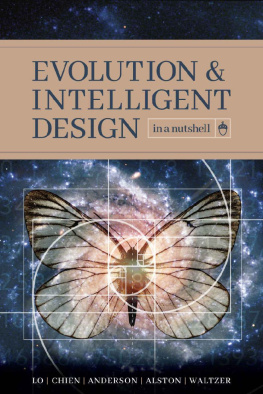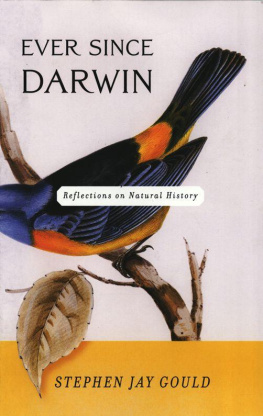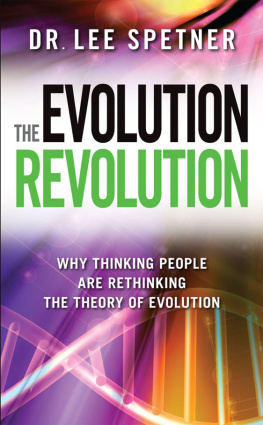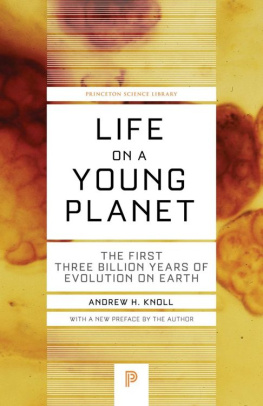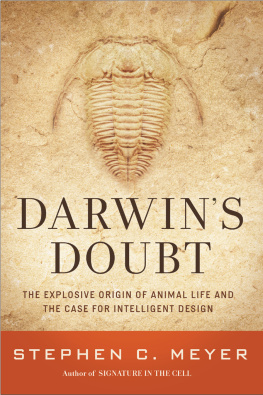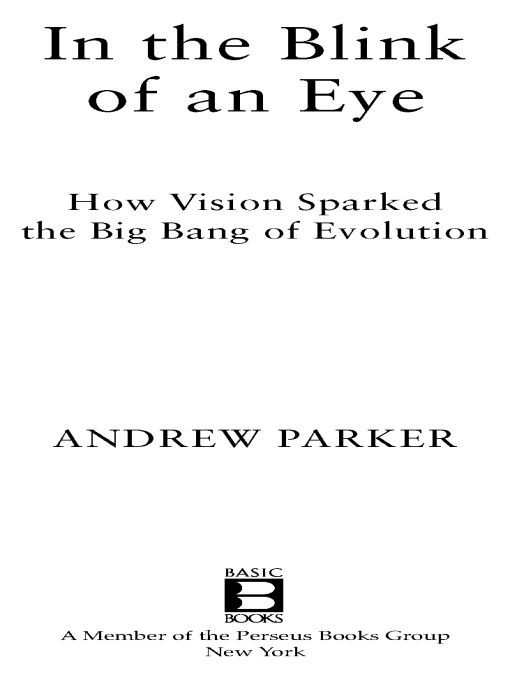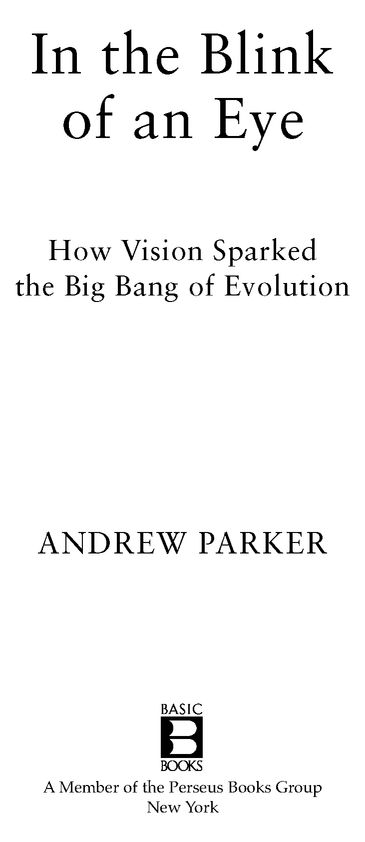Table of Contents
Table of Figures
Praise forIn the Blink of an Eye
A well-written book, containing much really interesting science and a good strong hypothesis that will surely stimulate others to praise, to criticize and try to refine or replace.
-Washington Post Book World
Parkers research has that pop-science wow factordramatic transformations over aeons of time, alien-like life forms, fragments of the secret of our own emergence.
-Village Voice
Compelling.
-Science News
[Parker is a] genius, a cool-headed logician with the soul of an artist.... [He] has managed to crack a mystery that evolutionists have fretted over since Darwin first sharpened his quill... In the Blink of an Eye might very well make him a celebrity.
-Seed
Parkers ideas are fascinating.
-Boston Globe
Parker will have more than a few palaeontologists choking on their cornflakes.
-New Scientist
The outlines of [Parkers] argument are laid out with compelling logic and clarity, and his solution to the Cambrian mystery seems both brilliant and obvious: we must have been blind to miss it.
-London Sunday Telegraph
In the Blink of an Eye presents its arguments the way a prosecutor presents a criminal case against the accused in a courtroom melodrama.... I dont think you can find a more reader-friendly introduction to evolutionary biology.
-San Jose Mercury News
Full of fascinating scientific lore... The flash of unexpected insight that characterizes [Parkers] discovery is of the rarest kind, and with a book like In the Blink of an Eye, readers have a chance to share in one of those aha! moments that happen so infrequently in the world of science.
-Readerville Journal
[Parkers] clarity will thrill science fans, as will his revolutionary theory.
-Booklist
Parkers conclusion is both convincing and surprisingly fresh... Compelling... Cutting-edge science, highly recommended.
-Kirkus (starred review)
An informative work of easily accessible science.
-Boston Herald
A young, brash zoologist... Parker makes a compelling case.
-San Diego Union Tribune
An insightful glimpse into the mind of the scientist... [A] thought-provoking work.
-Library Journal
A brilliant and eminently readable evolutionary detective tale... Parkers energy and intelligence are undeniable... [He] has led us down a remarkable trail and one hopes he has many others to explore.
-Roanoke Times
[Parkers] central argument certainly deserves careful attention... fascinating examples.
-American Scientist
To my parents
When you have eliminated the impossible, whatever remains, however improbable, must be the truth
SIR ARTHUR CONAN DOYLE, A Study in Scarlet (1887)
Preface
The case [for the abrupt appearance of Cambrian fossils] at present must remain inexplicable... and may be truly urged as a valid argument against the views [on evolution] here entertained
CHARLES DARWIN, On the Origin of Species (sixth and final edition, 1872)
The Big Bang in animal evolution was perhaps the most dramatic event in the history of life on Earth. During this blink of an eye in such history, all the major animal groups found today evolved hard parts and became distinct shapes, simultaneously and for the first time. This happened precisely 543 million years ago, at the beginning of a period in geological history called the Cambrian, and so has become known as the Cambrian explosion. But what lit the Cambrian fuse?
Until now, we have been without an acceptable explanation for this extraordinary burst in evolution - there is strong evidence against all the contending theories put forward. If time is given to consider most previous explanations, it becomes clear that in fact they explain a different evolutionary event and not the Cambrian explosion, as will be introduced early on in this book. That these two events were once amalgamated had been extremely misleading. In short, we know very well what happened during evolutions Big Bang, indeed numerous books have already been written on this question, but we dont know why it happened. Why it happened is the puzzle this book sets out to solve.
The mention of a puzzle and a search for clues is very appropriate to the story behind the discovery of the why, and this book grew naturally into a detective story. After all, this topic will emerge as real scientific crime. I have spent many years stumbling into different fields of science, and it was while travelling along this uneven road that I ended up at the doorstep of the Cambrian. Almost by themselves, the clues towards a Cambrian theory just kept on accumulating, and eventually, after there were still no signs of evidence to the contrary, I became satisfied that the truth had remained.
To uncover the real cause of the Cambrian explosion all the pieces of the puzzle are needed. After introducing the problem in Chapter 1, the following seven chapters of this book will be dedicated to the more significant pieces. In the course of these chapters a multidimensional picture will be painted showing how life works today, what happened during the course of evolution on Earth and, consequently, how life worked at different times in the geological past. Having been warned that the more technical terms I adopt the smaller my audience will be, I have responded by keeping scientific names and terminology to a minimum. I have tried to use, or even invent, common names of animals wherever possible, and must apologise if this method appears too simplistic or distracting. Nonetheless, the most important, recurring scientific terms have necessarily survived the editorial process.
By the beginning of the penultimate chapter, all the clues needed to solve the why of the Cambrian explosion will have been presented. Scientific evidence will be extracted not just from biology, but also geology, physics, chemistry, history and art. Subjects such as eyes, colour, fossils, predators, Egyptian statues, the deep sea and coral reefs will be entertained. What was the significance of Maxwells breakfast or of Newtons peacock to our understanding of evolution? Might they be on a par with Charles Doolittle Walcotts monumental discovery of the Cambrian Burgess Shale fossils themselves? I feel that the Cambrian explosion is something worthy of anyones time, and that the explanation of this event is worthwhile publicising. I hope readers will agree.
My road to the Cambrian was possible only because of some wonderful opportunities presented to me, for which I am extremely grateful. In the first place there were Penny Berents and Pat Hutchings, who offered me my first position at the Australian Museum in Sydney. Here I was lucky enough to spend several years examining living and preserved specimens from every major animal group on Earth - an experience which contrasted greatly with my days studying animal diversity from a textbook as an undergraduate. Then there were Jim Lowry and Noel Tait, at the Australian Museum and Macquarie University (Sydney) respectively, who registered my research for a Ph.D. degree, and taught me so much about animal diversity, ecology and evolution. But I also received considerable help and encouragement from many more members of the Australian Museum than I have space to list here. I am grateful to them all.


